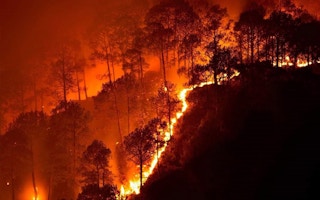Despite global promises to act on climate change, the Earth continues to warm. The annual planetary temperature confirms that the last 10 years were on average 0.2°C warmer than the first 10 years of this century. And each decade since 1980 has been warmer than the decade that preceded it.
The year 2019 was also one of the three warmest years since formal temperature records began in the 19th century. The only warmer years – in some datasets but not all – were 2016 and 2015. And all the years since 2013 have been warmer than all other years in the last 170.
The link with fossil fuel combustion remains unequivocal: carbon dioxide levels in the atmosphere increased by 2.5 parts per million (ppm) in 2019 alone. These now stand at 409 ppm. The global average for most of human history has hovered around 285 ppm.
Two more greenhouse gases – nitrous oxide and methane, both of them more short-lived – also increased measurably.
The study, in the Bulletin of the American Meteorological Society, is a sobering chronicle of the impact of climate change in the decade 2010-2019 and the year 2019 itself. It is the 30th such report, it is signed by 528 experts from 61 countries, and it is a catalogue of unwelcome records achieved and uncomfortable extremes surpassed.
July 2019 was the hottest month on record. Record high temperatures were measured in more than a dozen nations across Africa, Europe, Asia and the Caribbean. In North America, Alaska scored its hottest year on record.
The Arctic as a whole was warmer than in any year except 2016. Australia achieved a new nationally average daily temperature high of 41.9°C on 18 December, breaking the previous 2013 record by 1.6°C. But even Belgium and the Netherlands saw temperatures higher than 40°C.
For the 32nd consecutive year, the world’s alpine glaciers continued to get smaller and retreat further uphill. For the first time on record in inland Alaska, when measured at 26 sites, the active layer of permafrost failed to freeze completely. In September, sea ice around the Arctic reached a minimum that tied for the second lowest in the 41 years of satellite records.
“
This millennium has been warmer than any comparable period since the Industrial Revolution.
Robert Dunn, UK Met Office
Catalogue of extremes
Global sea levels set a new high for the eighth consecutive year and are now 87.6mm higher than the 1993 average, when satellite records began. At a depth of 700 metres, ocean temperatures reached new records, and the sea surface temperatures on average were the highest since 2016.
Drought conditions led to catastrophic wildfires in Australia, in Indonesia, Siberia and in the southern Amazon forests of Bolivia, Brazil and Peru. And around the equator, meteorologists catalogued 96 named tropical storms: the average for 1981 to 2010 was 82. In the North Atlantic, just one storm, Hurricane Dorian, killed 70 people and caused $3.4bn (£2.6bn) in damage in the Bahamas.
“This millennium has been warmer than any comparable period since the Industrial Revolution. A number of extreme events, such as wildfires, heatwaves and droughts, have at least part of their root linked to the rise in global temperature,” said Robert Dunn, of the UK Met Office, one of the contributors.
“And of course the rise in global temperature is linked to another climate indicator, the ongoing rise in emissions in greenhouse gases, notably carbon dioxide, nitrous oxide and methane.”
This story was published with permission from Climate News Network.

















